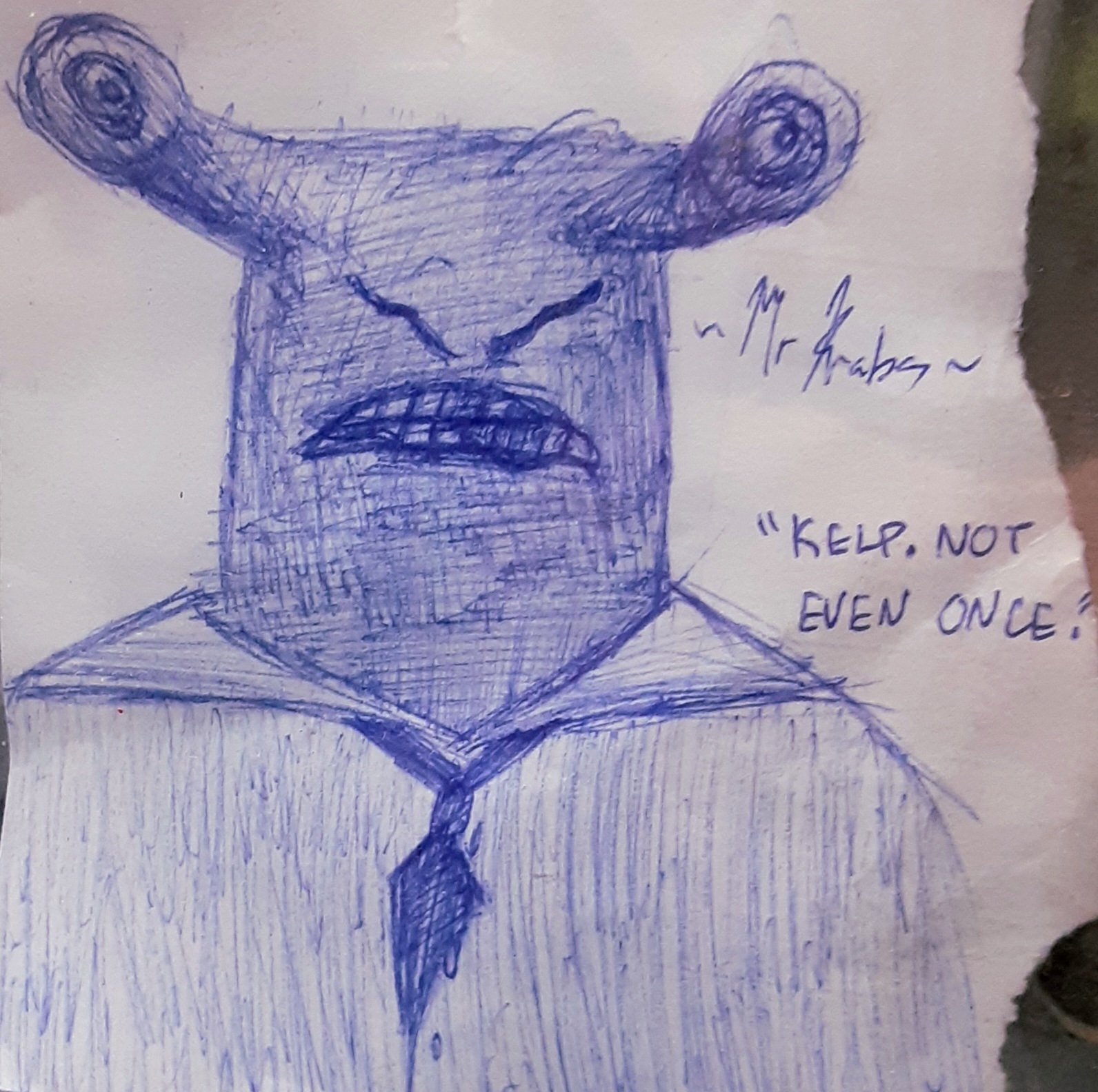“my, my! humans! so aggressive.”
rape, murder, nukes, war, torture, power, seemingly unlimited greed…
why don’t i have that insatiable drive?
can’t all be how i was raised, can it?
do you know of any studies or philosophical insights?
thx! 🙂
Lead exposure in childhood is one thing we know leads to poorer impulse control; that is to say, being short-sighted and selfish.
I have awful impulse control (severe ADHD) but usually I just eat an entire packet of Oreos instead of exploiting people for selfish reasons.
Imagine you were filthy rich and a country had all Oreos and would ban all exports and tourists. Sure you wouldn’t bribe a minister or two? Give a poor kid some money and exploit them to build an over the border Oreo smugglers ring …?!
Err, yeah, I wouldn’t do that, I’d just buy some other kind of snack!
That kind of comes down to values, though. Does a person value Oreos over honesty and integrity, or do they just enjoy Oreos? Someone might also enjoy most foods, they might prefer to fence, or they might prefer to knit.
TBH if I was filthy rich, I would help my loved ones, keep a decent retirement savings (reasonable), and then probably give the rest away. I would feel pretty bad keeping that kind of money if I knew that other people were starving and homeless. Happier people make for a better society too, imo.
That’s exactly the kind of long-term thinking to which lead exposure is deleterious.
And not to mention parents with high lead exposure who have anger issues, poor impulse control, etc. don’t make for good carers of small, loud and unpredictable children.
This is basically the old nature vs. nurture debate.
We all know of course the environment in which you grow up seriously influences your personality, however a surprising amount of human personality is attributed to genetics. There are case studies of twins separated at birth that will give you chills, as well as adoption studies where personalities of adopted children are more in alignment with their bio parents than the parents who raised them.
There are two personality “disorders” described in psychology that are commonly associated with the behaviors you’re describing. Antisocial personality disorder is characterized by a lack of empathy, disregard for cultural norms or rules, and engaging in behavior that harms others. Narcissistic personality disorder is characterized by a lack of empathy, a relentless focus on self-promotion and self-preservation without regard for how one’s actions affect others, and a drive to project power or status, no matter how real or imagined that power may be. Both of these disorders seem to have some degree of heritability associated with them, but it’s not super clear cut, and it’s likely that even with a genetic predisposition someone has to be brought up in a certain environment for the disorder to develop.
All this said, even more of human behavior is culturally and socially bound. Go back in time 1500 years, for example, and war, torture, execution, rape, and more were much more prevalent and socially acceptable than they are today. Even today there are cultures that tolerate more or less of each of these things.
This is my completely unsourced two cents
Anecdotally, in my old neighborhood, I knew of three families with a child adopted as an infant from from troubled circumstances. All three were raised together in the same household and with the same parenting as their non-adopted siblings. It’s a wealthy neighborhood, so the biological children ended up as studious, stable, high achievers.
The adopted kids, not so much. One worked at the store where I worked, and got fired eventually, since she was flaky, unable to focus on the job, and solicitous of any and all male attention. She showed up on the front page of local news sites one day because her parents reported her as a missing person. Turns out she went home with a guy she met at a bar and didn’t bother to tell anybody. Her co-workers were not surprised.
Another was my apartment neighbor, who was 19 and dating a 50-something guy. She couldn’t hold down a job, and he supported her. She eventually moved in with him, and told a homeless friend that he could move into the apartment her parents paid for. (He was a lot cleaner than the rabbit she barely cared for.) After she left, the fruit fly infestation in my apartment cleared up, and my landlord threw out the refrigerator from her unit rather than clean the maggots out of it.
The third was the worst. She got involved with a guy, hatched a plan for he and his friend to rob her parents, but the robbery went wrong and they murdered them instead.
The fact that all three turned out the polar opposite of the biological kids in the same environment sure points to some inborn traits.
Well it is an anecdote. Can’t draw any real conclusions there. Too many variables. How old were the kids when adopted? Were they abused or neglected or adopted right at birth? How well did the parents treat the adopted vs non-adopted kids? Were the adopted kids healthy at birth or could fetal alcohol syndrome have played a factor? Were there issues with discrimination based on race? And myriad other questions…
Crying babies who are yelled at, spanked and/or ignored, grow their fundamental brain structures around those experiences. Getting moved to loving homes won’t erase that.
There are a lot of studies that connect ADHD with early childhood trauma/abuse.
These are crazy stories! And valuable because they show a more well to do side than the usual. My experience with adopted and natural born kids being raised together comes from the other end of the socioeconomic ladder. My brother is a foster parent and they specialize in neonates and babies but also have adopted kids and the difference between their natural and adopted kids are pretty minimal. The kids are still young now but I don’t see any difference that would affect future life position outside of chance.
To me it sounds more like an environmental issue as this is what they all have in common.
I don’t have an answer to you but if you like this sort of discussions/topics, I highly recommend the book Behave by Sapolsky.
thanks! :)
I think it’s all about empathy.
The ability to experience empathy, like any other trait varies at the biological level (and probably other levels as well). It only makes sense some would be born with little ability to experience empathy, some with so much empathy they worry about ants, but most people in the middle.
Those with little empathy (and therefore little sympathy or compassion, as those come from empathy) don’t allow morality to restrain their behavior so they tend to rise to power.
Most of the world’s problems are because people who are effectively psychopaths are in charge everywhere. The psychopaths have created a world through capitalism that pits us against each other and brings out the worst in us.
If you had the ability to push a button and divert $0.01 from a random million US bank accounts in a way that would leave no trace, would you press the button?
Power corrupts. Most people are not strong enough to resist the abuse of power. It starts very small - such a minor, harmless thing, but then you abuse power more and more to cover your tracks or to benefit yourself more.
Yup. Nature aaaand nurture. There are countless studies and conversations and theories about this, but given the sheer number of variables and the very difficult question of “is anything you experience experienced the same way by others?”, there aren’t many definitive answers and no universal answers.
I would guess a person’s life circumstances. Humans tend to reflect pain they’re experiencing onto others. If you’re hungry, that’s a form of pain. If you’re neglected, that’s a form of pain. Even the sons of billionaires experience pain, probably in a way that’s hard for reg folks to grasp.
Also, I think your dopamine regulation being all messed up might also contribute. Those people who seem to flail and rage because nothing can seem to satisfy them.
Also, everyone does terrible things and hurts others. You can be charitable and kind from one perspective and an oppressor in ways you won’t allow yourself to see. We all do it.
We know that people who have less tend to be more generous than people who have more.
Actually, it isn’t so much a matter of being rich vs being poor as it is the level of inequality that influences generosity. People who have more are about as likely as those who have less to be generous when inequality is low, and according to some studies they are actually even more likely to do so. But when inequality is high then the generosity of the wealthy decreases.
Thanks, I didn’t know. This is interesting: “…there might be something about the experience of elevated power and status that reduces our willingness to give to others.” Political realism on a micro scale?
I really like this question and it is one I think about a lot when daydreaming since having kids. When would I know if they’ve gone bad? If they do end up antisocial or narcissistic will I be able to point to a situation or chain of events that caused it? Will I even know?
Don’t have kids. Global fresh water reserves will be 40% over capacity by 2030, and 90% of global top soil and arable land is at risk of depletion by 2050.
And that’s just water and food, add climate collapse and fascism, and billions of people are going to die in the next 30 years.
This is not a world you should be looking at and thinking about adding more lives to.
While I’d say altruism is not a virtue the way it is defined in our culture, I will say that who we are is about 50% nature and 50% nurture, and inside we are very different beings for one reason or other. A born sociopath is only human the same as you in visible form, the being is nothing like you. A person who was badly abused and tattoos his face and perpetuates abuse on those around him is completely different from you both. A monk in a monestsry and an Instagram influencer are completely different beings inside, besides some basic neurology that makes them both human. If you could see the being inside every human they’d look as different as Pokémon. That’s my philosophical insight.
I don’t think it’s any one factor. I actually think it’s dangerous to think that there iis - the idea that there is some inherent gene or trait or personality type or social condition or event that makes a person evil, has, ironically led to some evil things. The world is a complex web of cause and effect and belief and experience and different ways of reacting to emotion and different decision making and every person is located in a different relationship to all of those things. There’s no one type or person or type of environment or situation that causes bad things, just a series of complex things that are worth being nuanced and thoughtful about.
This guy wrote a book a long time ago which goes into this. Something about ‘material conditions’?
This is the answer, though many don’t like it.
Great question. No.
Skyward fan?
just finished the 2nd audiobook a few days ago ;)








